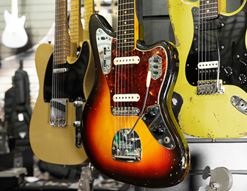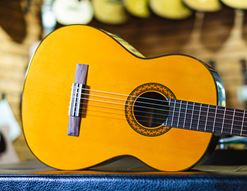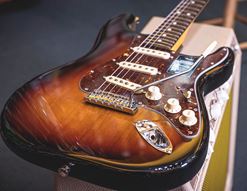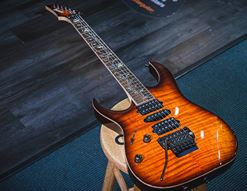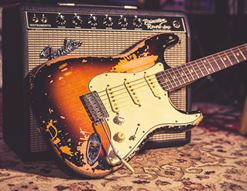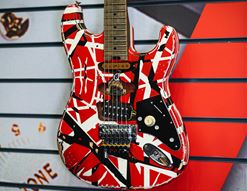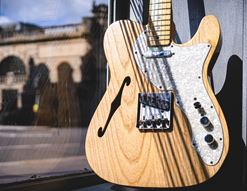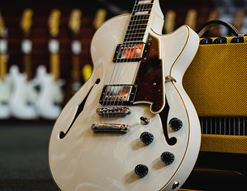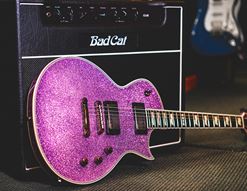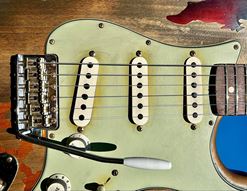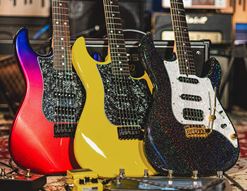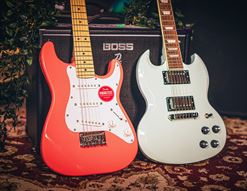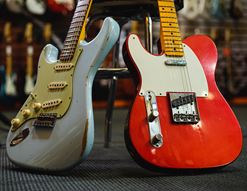Does the weight of a guitar matter to you?
It’s one of those ongoing, neverending debates throughout guitar circles, rather like the relic debate and the tubes vs digital back-and-forth. It’s always good to get into the nitty gritty about these things, and so guitar weight is today’s topic.
Does the weight of an instrument influence your decision when buying a guitar? If so, is it for ‘sore back’ reasons or tonal reasons? I’ll investigate this stuff today, and cross-compare a little bit of our collective ‘received wisdom’ with some plain old facts. I’m neither conducting tests nor being unscientific here, but instead looking at all of the possible angles a player may consider when it comes to the weight of a guitar.
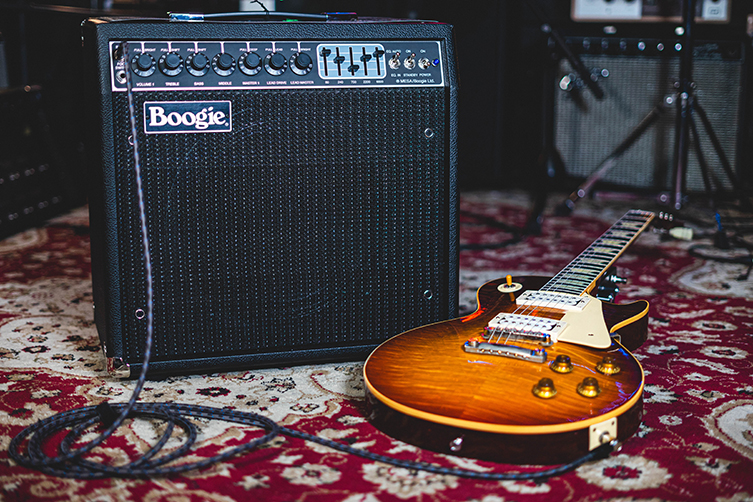
Contents
Do Les Pauls Really Weigh So Much More than Strats?
Do Heavy Les Pauls Sound Better Than Light Les Pauls?
So Does a Guitar’s Weight Matter?
Lightweight Bolt-on Guitars
If you are somebody who struggles with back pain, a lightweight guitar is an obvious thing to use. Why make life more difficult for yourself when you don’t have to? Thankfully, a great deal of the multitudes of electric guitars that exist in the world are naturally light in weight.
Let’s take the world-famous Fender Stratocaster, for example. In its most standard form, it is an alder body, a maple bolted-on neck and a bunch of hardware. Alder isn’t a particularly heavy timber, and Strat bodies actually have a lot of the wood removed for both the electronics and the tremolo, so Strats are often amongst the lightest guitars available. Some of this translates to the tone, which we’ll get to soon, but the average weight of a Strat is between 7 and 9 pounds, which is roughly 3.2-4.1kg.
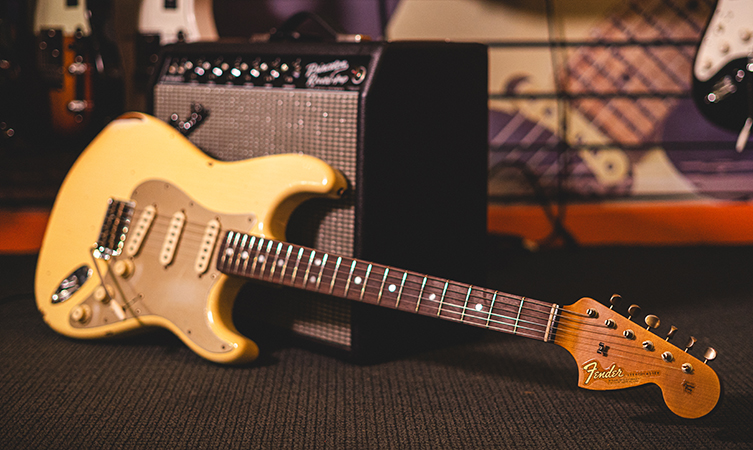
Weirdly, the Telecaster comes in at roughly the same weight, even though they have far less wood removed from the body! That’s an alder-bodied Tele by the way, not an ash model. Ash is often (not always) lighter, but too light and your guitar can start feeling like a toy!
According to many players on the forums, around 7lbs is the ideal weight for your typical bolt-on Fender style guitar. What these players base their opinions on isn’t massively obvious, but that’s the consensus.
Generally, we think of these types of guitars as lighter in weight, though some older 70s examples (are some from other eras) are still pretty heavy!
Mahogany Set-Neck Guitars
Traditionally, mahogany set-neck guitars - OK, I’m talking mainly about the Gibson Les Paul - have been noticeably heavier than the likes of Fenders and their copycats. Heaviness is part of the Les Paul's identity and mythology, and I wonder if some players 'hear' that mythology when they use such guitars. The Les Paul is built with slabs of mahogany - a wood that in reality varies wildly in weight - and a slice of maple on top, and the neck is glued in rather than bolted, so it's a completely different animal to the likes of a Strat or Tele.
Maple is actually a heavy, very dense timber. Its inclusion on many guitars as a neck ingredient may imply otherwise, but maple is actually far too heavy to make a solid guitar body from. Tonally it is bright, and so that is why most (not all) Les Pauls have a carved maple top: it’s both stronger and brighter than the darker-sounding mahogany used for the body.
Both timbers can be fairly weighty, and so Les Pauls tend to be heavy guitars that can weight anything from 9 to 12 lbs, which is 4 to around 5.4kg.
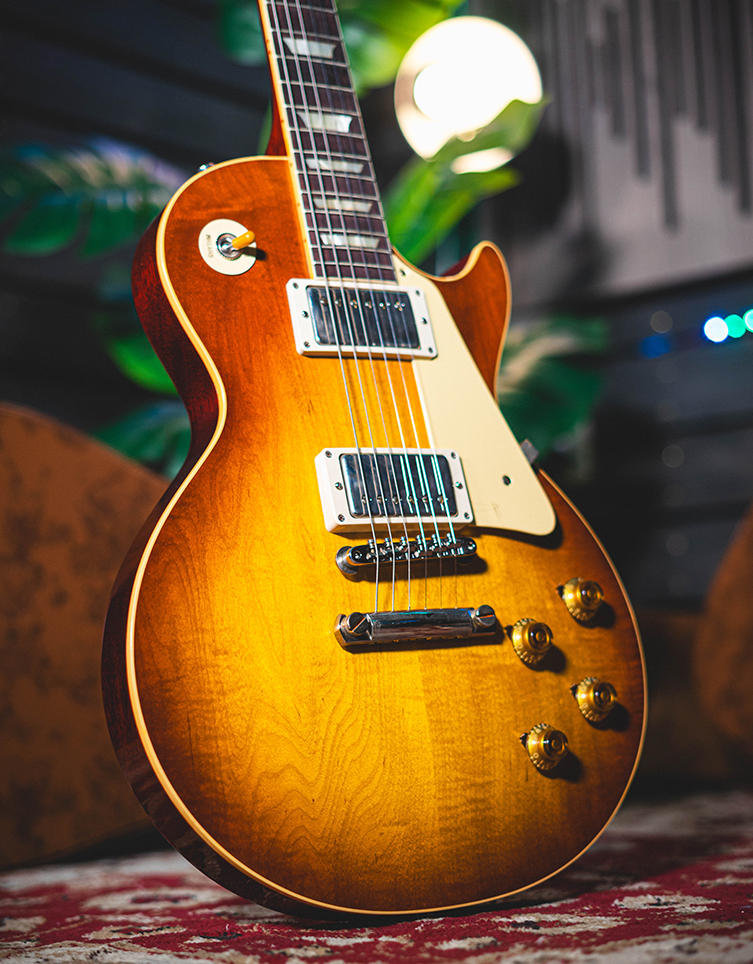
Do Les Pauls Really Weigh So Much More than Strats?
Let me actually make this more clear by illustrating a few possibilities, based on minimum and maximum examples:
- Light Strat (3.2kg) versus heavy Les Paul (5.4kg) = a difference of 2.2kg, making the Les Paul 68% heavier
- Heavy Strat (3.2 kg) versus light Les Paul (3.2kg) = a difference of 0.
- Average Strat weight (3.6kg) versus average Les Paul (4.76kg) = a difference of 1.16kg, making the average Les Paul 32.22% heavier than the average Strat.
So, from my arithmetic there, the best case scenario is that they weigh the same; the average difference in weight is a significant 32%; and at their most extreme differences, a Les Paul can weigh over 2/3 heavier than a Strat!
Those are some pretty big numbers!
Do Heavy Les Pauls Sound Better Than Light Les Pauls?
Now, we’re getting into the area of unscientific opinion. Do the heavier Les Pauls sound better than the lighter ones? As you know, there are lots of variables in any comparison, from amp settings to pickup choice to volume and so on. One way to investigate might be to get to guitars of the same model (and colour, for those who think that somehow contributes to the sound too) and playing into the exact same setup by the same player.
Luckily, our Keiran has done just that, so have a watch of this video to see what happened…
Did you hear a difference? Let me be a little bolder with you: if you heard either of those guitars in the context of a fully recorded, mixed and mastered song, would you be able to tell which one was which?
I don’t need an answer, but think on it.
Tone Chambering
More and more guitars today are built using tone chambers, which are basically holes drilled or carved into a guitar’s body prior to the top being fixed on, in order to relieve weight. You can’t see them and manufacturers say that you can’t hear them either. Some players disagree and hold it as a bone of contention. They want no weight relief, for tone reasons. Now, I’m not about to tell anybody they’re wrong on this - because who am I? - but I do have a lot of experience here. If you want my take, then here it is:
I’ve owned Gibsons with and without chambers. I’ve played and sold a great many of both. I personally do not notice a significant enough change in sound, timbre or tonal response to care about the inclusion of chambers. I think you will hear minute differences between two Les Pauls of exactly the same model if you try hard enough, and by that point, it’s something of a moot point.

I’d pay more attention to the neck feel, the actual sustain levels and output of the guitar (pickup height, pickup choice etc) and a dozen other things before I’d wonder if the guitar had some of the mahogany removed under the hood. Actually, the fact that it isn’t immediately obvious tells me that the chambers are a negligible part of the situation. I’d certainly not let the matter influence my decision when choosing one guitar over the other. Plenty of other things would influence my decision, but personally, that one doesn’t really come into it.
I would also add that, in my opinion, a chambered Les Paul sounds like a Les Paul, not an ES-335 or any other similar guitar.
The Issue of Neck Dive
Have you experienced ‘neck dive’ before? It’s when certain light weight guitars are more top heavy at the headstock end, and when you put one on to play, it just slides on your shoulder, the headstock careening towards the floor.
Not ideal!
There are certain guitars that are more notorious for this than others. I’ve found neck dive with SG and 335-style guitars, from a number of brands. Heavier guitars do not seem to suffer from this affliction, but for those that do, it can be a real problem.
However, there are things you can do to mitigate the neck dive. I’ve seen people going as far as adding weights to their guitar straps, which I'll admit did work, but that’s not something you really want to do, is it? I suggest going for a leather guitar strap that is untooled on the back. The textured leather will grip to your clothes much better than a shiny, slippery strap, and your guitar will not make a swandive to the floor!

Does Your Audience Care?
If you are out playing lots of gigs, it obviously matters which guitar you choose to play. How it looks, how it plays, how it sounds and, yes, how it weighs will all come into the equation. The reason that I’m bringing this into today’s debate is that guitarists can often get stuck in their own heads about all of this stuff. It’s important to put the correct perspective across here: your audience cares very little about anything other than your performance and, to a lesser extent, how cool you look.
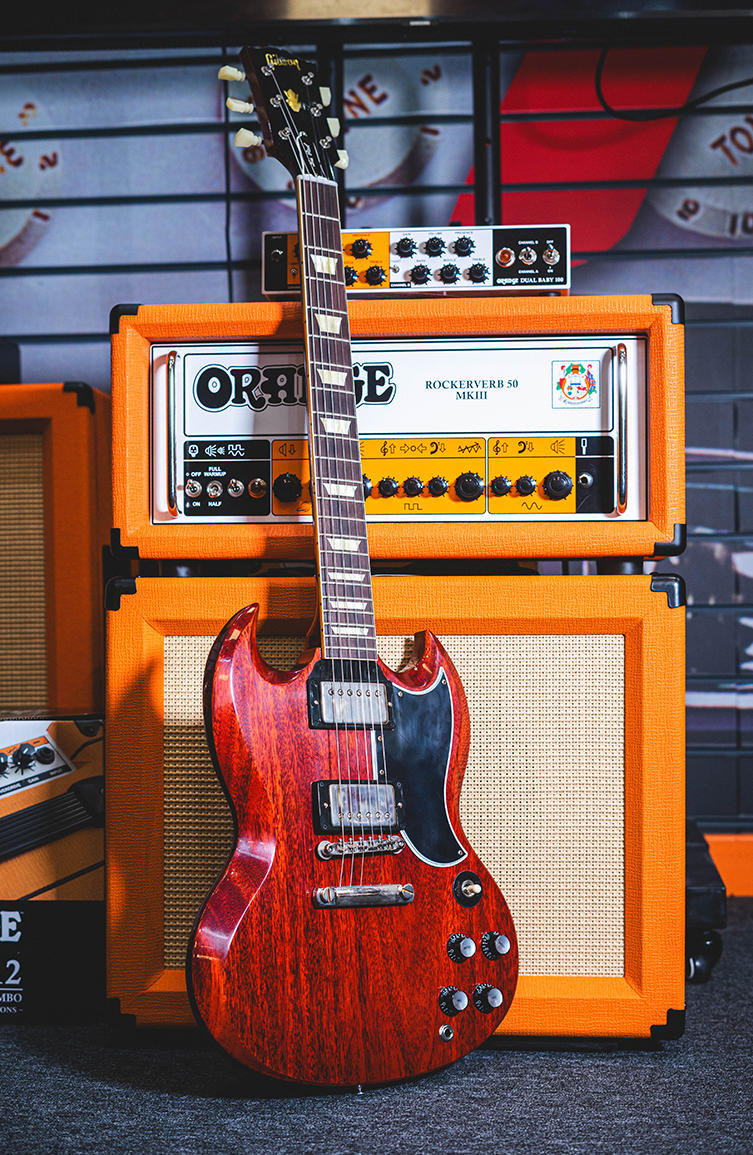
These are, of course, subjective things, but if your 12lb guitar is causing you to stoop over and wear a pained expression all night, then you may not be playing to your strengths, if you get me. Back pain carries on long after the end of the gig, and those who struggle with sciatica, slipped discs or even bad posture will almost certainly base their guitar choices on how aggravating a guitar’s weight will be on their back.
Your audience, though? They can’t hear whether a guitar is light, heavy, chambered or not. All they see and hear is your performance. Whichever guitar allows that performance to be the best is the one you should use!
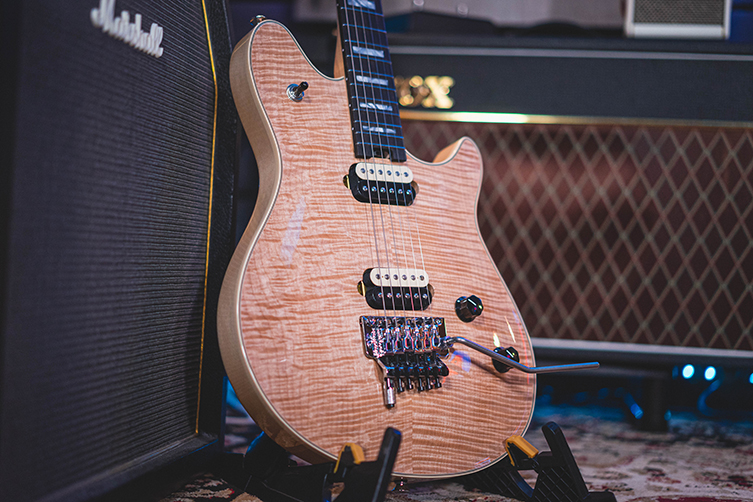
So Does a Guitar’s Weight Matter?
To round things up, let’s settle on some answers here. Does a guitar’s weight matter?
Well, yes it does, but probably not in the ways that many of us are concerned about. For those with back pain, shoulder pain and so on, yes of course it makes sense to limit the weight of your guitar. There are tons of light guitars out there, from traditional Fenders to space age Strandbergs.
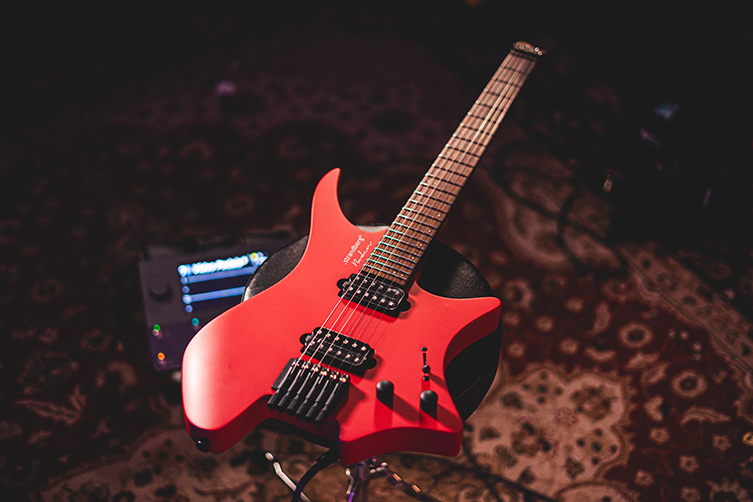
For those who believe that heavier guitars sound better…in my opinion, I’ve never really found that to be true. As primarily a Les Paul user, I haven’t encountered a situation where the guitar’s weight was a significant factor one way or another. That includes Standards, Juniors, Studios and Customs. I’m not really talking about ultra-specific minutiae here, though: I’m talking about everyday playing, everyday sounds (crunch and distortion minimises all differences, after all). If you were in the position of owning several nice Les Pauls - and that isn’t something that most of us are - then you may be able to detect microscopic differences in the sound of one over another. That doesn’t mean that one is better than the rest, let’s not forget!
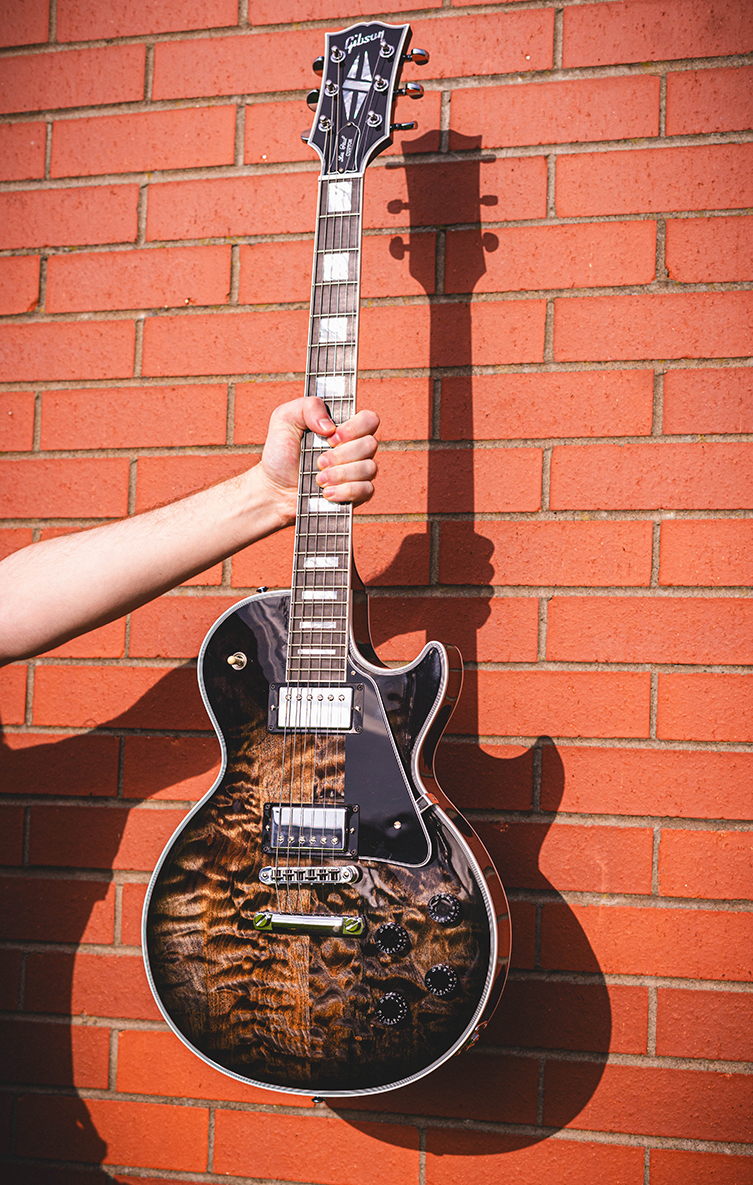
I personally have never played a Strat that didn’t sound like a Strat, and I’ve never played a Les Paul that didn’t sound like a Les Paul. In that regard, the weight was quite beside the point. To speak plainly, all guitars feel and sound a little different. Just go with what works for you, and don’t worry too much about preconceptions.


